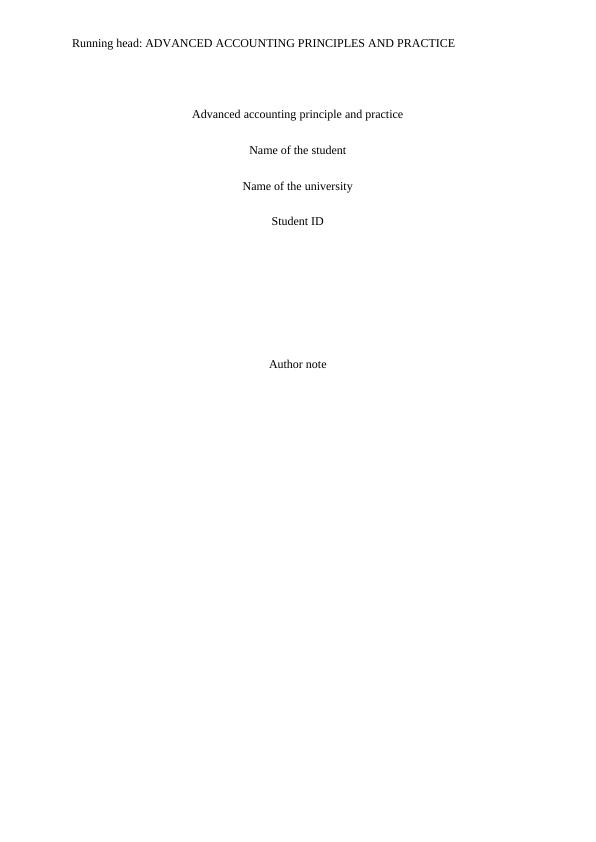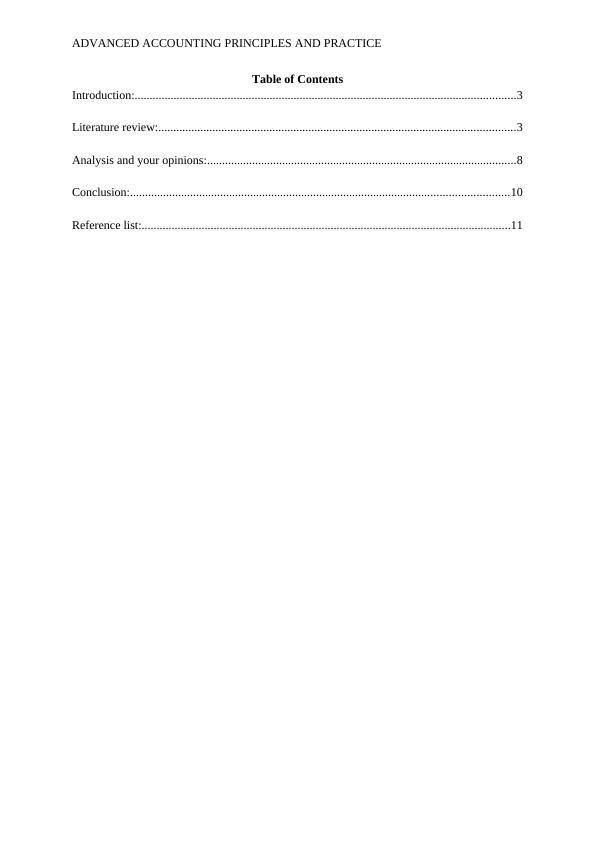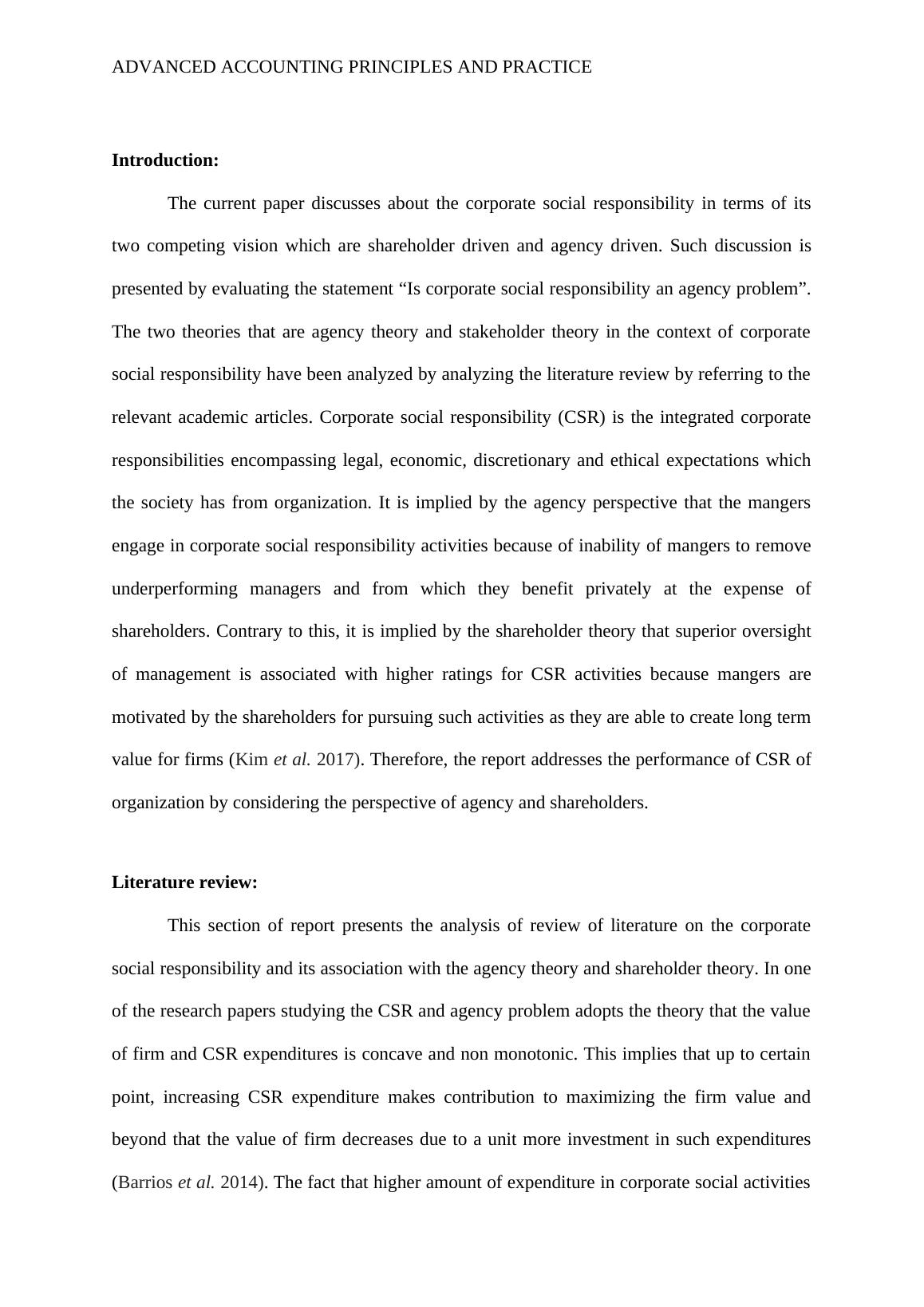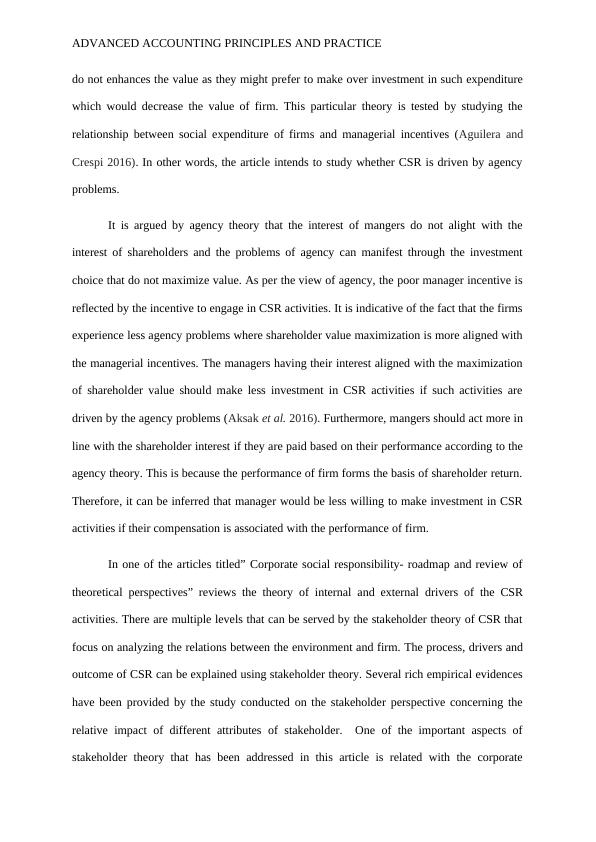Corporate Social Responsibility and Agency Problems
Added on 2023-01-18
14 Pages3592 Words51 Views
Running head: ADVANCED ACCOUNTING PRINCIPLES AND PRACTICE
Advanced accounting principle and practice
Name of the student
Name of the university
Student ID
Author note
Advanced accounting principle and practice
Name of the student
Name of the university
Student ID
Author note

ADVANCED ACCOUNTING PRINCIPLES AND PRACTICE
Table of Contents
Introduction:...............................................................................................................................3
Literature review:.......................................................................................................................3
Analysis and your opinions:.......................................................................................................8
Conclusion:..............................................................................................................................10
Reference list:...........................................................................................................................11
Table of Contents
Introduction:...............................................................................................................................3
Literature review:.......................................................................................................................3
Analysis and your opinions:.......................................................................................................8
Conclusion:..............................................................................................................................10
Reference list:...........................................................................................................................11

ADVANCED ACCOUNTING PRINCIPLES AND PRACTICE
Introduction:
The current paper discusses about the corporate social responsibility in terms of its
two competing vision which are shareholder driven and agency driven. Such discussion is
presented by evaluating the statement “Is corporate social responsibility an agency problem”.
The two theories that are agency theory and stakeholder theory in the context of corporate
social responsibility have been analyzed by analyzing the literature review by referring to the
relevant academic articles. Corporate social responsibility (CSR) is the integrated corporate
responsibilities encompassing legal, economic, discretionary and ethical expectations which
the society has from organization. It is implied by the agency perspective that the mangers
engage in corporate social responsibility activities because of inability of mangers to remove
underperforming managers and from which they benefit privately at the expense of
shareholders. Contrary to this, it is implied by the shareholder theory that superior oversight
of management is associated with higher ratings for CSR activities because mangers are
motivated by the shareholders for pursuing such activities as they are able to create long term
value for firms (Kim et al. 2017). Therefore, the report addresses the performance of CSR of
organization by considering the perspective of agency and shareholders.
Literature review:
This section of report presents the analysis of review of literature on the corporate
social responsibility and its association with the agency theory and shareholder theory. In one
of the research papers studying the CSR and agency problem adopts the theory that the value
of firm and CSR expenditures is concave and non monotonic. This implies that up to certain
point, increasing CSR expenditure makes contribution to maximizing the firm value and
beyond that the value of firm decreases due to a unit more investment in such expenditures
(Barrios et al. 2014). The fact that higher amount of expenditure in corporate social activities
Introduction:
The current paper discusses about the corporate social responsibility in terms of its
two competing vision which are shareholder driven and agency driven. Such discussion is
presented by evaluating the statement “Is corporate social responsibility an agency problem”.
The two theories that are agency theory and stakeholder theory in the context of corporate
social responsibility have been analyzed by analyzing the literature review by referring to the
relevant academic articles. Corporate social responsibility (CSR) is the integrated corporate
responsibilities encompassing legal, economic, discretionary and ethical expectations which
the society has from organization. It is implied by the agency perspective that the mangers
engage in corporate social responsibility activities because of inability of mangers to remove
underperforming managers and from which they benefit privately at the expense of
shareholders. Contrary to this, it is implied by the shareholder theory that superior oversight
of management is associated with higher ratings for CSR activities because mangers are
motivated by the shareholders for pursuing such activities as they are able to create long term
value for firms (Kim et al. 2017). Therefore, the report addresses the performance of CSR of
organization by considering the perspective of agency and shareholders.
Literature review:
This section of report presents the analysis of review of literature on the corporate
social responsibility and its association with the agency theory and shareholder theory. In one
of the research papers studying the CSR and agency problem adopts the theory that the value
of firm and CSR expenditures is concave and non monotonic. This implies that up to certain
point, increasing CSR expenditure makes contribution to maximizing the firm value and
beyond that the value of firm decreases due to a unit more investment in such expenditures
(Barrios et al. 2014). The fact that higher amount of expenditure in corporate social activities

ADVANCED ACCOUNTING PRINCIPLES AND PRACTICE
do not enhances the value as they might prefer to make over investment in such expenditure
which would decrease the value of firm. This particular theory is tested by studying the
relationship between social expenditure of firms and managerial incentives (Aguilera and
Crespi 2016). In other words, the article intends to study whether CSR is driven by agency
problems.
It is argued by agency theory that the interest of mangers do not alight with the
interest of shareholders and the problems of agency can manifest through the investment
choice that do not maximize value. As per the view of agency, the poor manager incentive is
reflected by the incentive to engage in CSR activities. It is indicative of the fact that the firms
experience less agency problems where shareholder value maximization is more aligned with
the managerial incentives. The managers having their interest aligned with the maximization
of shareholder value should make less investment in CSR activities if such activities are
driven by the agency problems (Aksak et al. 2016). Furthermore, mangers should act more in
line with the shareholder interest if they are paid based on their performance according to the
agency theory. This is because the performance of firm forms the basis of shareholder return.
Therefore, it can be inferred that manager would be less willing to make investment in CSR
activities if their compensation is associated with the performance of firm.
In one of the articles titled” Corporate social responsibility- roadmap and review of
theoretical perspectives” reviews the theory of internal and external drivers of the CSR
activities. There are multiple levels that can be served by the stakeholder theory of CSR that
focus on analyzing the relations between the environment and firm. The process, drivers and
outcome of CSR can be explained using stakeholder theory. Several rich empirical evidences
have been provided by the study conducted on the stakeholder perspective concerning the
relative impact of different attributes of stakeholder. One of the important aspects of
stakeholder theory that has been addressed in this article is related with the corporate
do not enhances the value as they might prefer to make over investment in such expenditure
which would decrease the value of firm. This particular theory is tested by studying the
relationship between social expenditure of firms and managerial incentives (Aguilera and
Crespi 2016). In other words, the article intends to study whether CSR is driven by agency
problems.
It is argued by agency theory that the interest of mangers do not alight with the
interest of shareholders and the problems of agency can manifest through the investment
choice that do not maximize value. As per the view of agency, the poor manager incentive is
reflected by the incentive to engage in CSR activities. It is indicative of the fact that the firms
experience less agency problems where shareholder value maximization is more aligned with
the managerial incentives. The managers having their interest aligned with the maximization
of shareholder value should make less investment in CSR activities if such activities are
driven by the agency problems (Aksak et al. 2016). Furthermore, mangers should act more in
line with the shareholder interest if they are paid based on their performance according to the
agency theory. This is because the performance of firm forms the basis of shareholder return.
Therefore, it can be inferred that manager would be less willing to make investment in CSR
activities if their compensation is associated with the performance of firm.
In one of the articles titled” Corporate social responsibility- roadmap and review of
theoretical perspectives” reviews the theory of internal and external drivers of the CSR
activities. There are multiple levels that can be served by the stakeholder theory of CSR that
focus on analyzing the relations between the environment and firm. The process, drivers and
outcome of CSR can be explained using stakeholder theory. Several rich empirical evidences
have been provided by the study conducted on the stakeholder perspective concerning the
relative impact of different attributes of stakeholder. One of the important aspects of
stakeholder theory that has been addressed in this article is related with the corporate

End of preview
Want to access all the pages? Upload your documents or become a member.
Related Documents
Research Paper on Executive Compensation and Contract-Driven Earnings Managementlg...
|13
|721
|460
Managerial Contingent Pay and Risk of Accounting Manipulationlg...
|6
|1620
|337
Shareholder value vs Stakeholder value in Modern Corporate Governancelg...
|14
|3396
|255
Agency Problem in Corporate Financelg...
|9
|2215
|371
Active Shareholders and CSR Policies for Corporate Sustainabilitylg...
|6
|950
|465
Corporate Governance Concern with Stakeholders and Sustainability Reportinglg...
|10
|2302
|213
